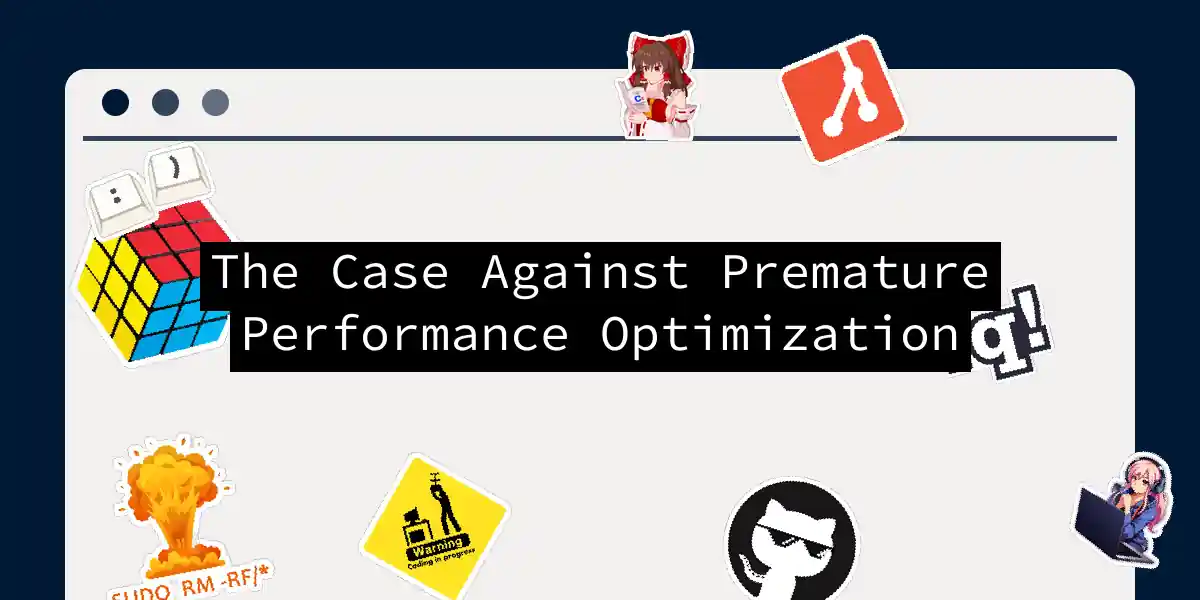The Siren Song of Premature Optimization
In the world of software development, there’s a tantalizing myth that has been passed down through generations of coders: the idea that optimizing your code from the very beginning is the key to creating lightning-fast, efficient software. However, this myth, often encapsulated in the phrase “premature optimization is the root of all evil,” is more than just a cautionary tale; it’s a guiding principle that can save you from a world of trouble.
The Origins of the Myth
The phrase “premature optimization is the root of all evil” was popularized by Donald Knuth, a legendary computer scientist, in his book “Structured Programming with go to Statements.” Knuth’s point was not that optimization is inherently bad, but rather that it should be approached with caution and only when necessary. He famously said, “We should forget about small efficiencies, say about 97% of the time: premature optimization is the root of all evil. Yet we should not pass up our opportunities in that critical 3%."[3][4].
Misplaced Priorities
When developers dive headfirst into optimization from the outset, they often sacrifice other crucial aspects of software development. Here are a few reasons why this approach can be detrimental:
Code Clarity and Maintainability
Optimized code can quickly become a nightmare to read and maintain. The pursuit of performance improvements can lead to convoluted logic, obscure variable names, and a general mess that makes it difficult for other developers (or even the same developer six months later) to understand and modify the code.
Overemphasis on Micro-Optimizations
Micro-optimizations, such as choosing between ++i and i++ in C-like languages, are a classic example of premature optimization. While ++i might be slightly faster because it avoids the extra step of copying the value of i, this difference is usually negligible in the grand scheme of things. Spending hours optimizing such micro-details can be a significant waste of time and resources[5].
Changing Requirements
Software development is an iterative process, and requirements can change dramatically over time. Optimizing code for specific cases early on can result in wasted efforts if those requirements shift. This is particularly true in agile development environments where flexibility and adaptability are key.
Lack of Profiling Data
Without comprehensive profiling and testing, it’s impossible to identify the real bottlenecks in your system. Premature optimization often leads to optimizing the wrong parts of the code, based on assumptions rather than data. Here’s a simple flowchart to illustrate the importance of profiling:
Complexity and Maintainability
Optimized code is often more complex and harder to maintain. The trade-off between performance and readability is a delicate one. Here’s an example of how a simple loop can become complicated due to premature optimization:
// Simple Loop
for (int i = 0; i < n; i++) {
// Do something
}
// Optimized Loop (but less readable)
for (int i = 0, j = n; i < j; ++i) {
// Do something
}
In the optimized version, the loop variable j is used to avoid the overhead of accessing n in each iteration. However, this minor optimization comes at the cost of readability.
Pressure to Meet Unrealistic Targets
Project managers and stakeholders often set unrealistic performance targets, pressuring developers to optimize code prematurely. This pressure can lead to rushed optimizations that are not well thought out and may not even address the real performance issues.
Developer Ego and Competition
Sometimes, developers optimize prematurely simply because they want to show off their coding skills or outdo their peers. This ego-driven approach can result in overly complex code that serves no practical purpose.
When to Optimize
So, when should you optimize? Here are some guidelines:
Design First, Optimize Later
Design your software with performance in mind, but do not optimize prematurely. Write clear, maintainable code first, and then profile and benchmark to identify bottlenecks. Here’s a sequence diagram illustrating this approach:
Consider Amdahl’s Law
Amdahl’s Law states that the maximum theoretical speedup that can be achieved by parallel processing is limited by the fraction of the program that cannot be parallelized. When deciding whether to optimize a specific part of the program, consider how much time is actually spent in that section. Optimizing a part that accounts for only a small fraction of the execution time will have a minimal impact on overall performance[3].
Conclusion
Premature optimization is indeed the root of many evils in software development. It leads to complex, hard-to-maintain code, distracts from more important aspects of development, and often results in wasted time and resources. By focusing on clear, maintainable code and optimizing only when necessary, based on profiling data, you can create software that is both efficient and easy to work with.
So the next time you’re tempted to optimize that loop or use a clever trick to save a few cycles, remember Knuth’s wisdom: forget about small efficiencies most of the time, and only optimize when it truly matters. Your codebase (and your sanity) will thank you.
